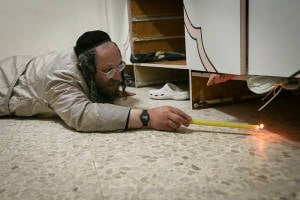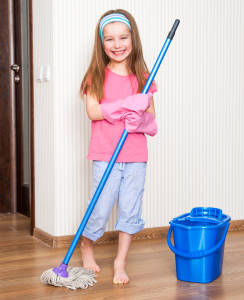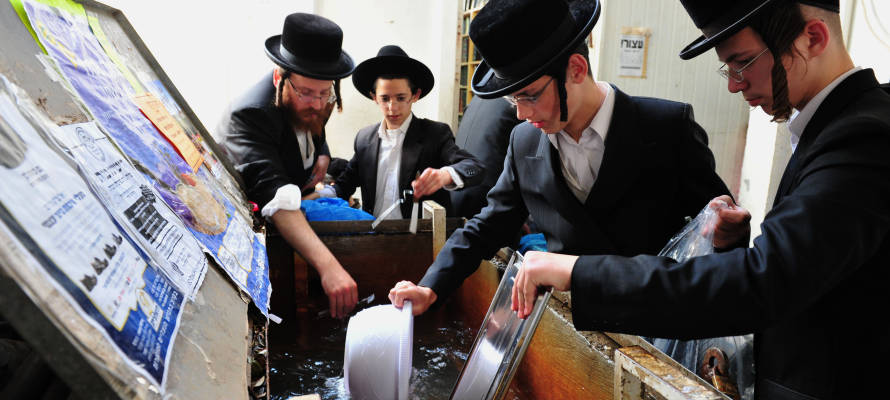
By Rabbi Ari Enkin, rabbinic director, United with Israel
The idea of cleaning your house for Passover should be a fun and even enjoyable experience! Don’t go overboard! No need to clean the ceilings or windows.
Before Passover we must rid our homes of chametz – the term referring to leavened products forbidden on Passover. Chametz is defined as a product made from one of five types of grain (wheat, barley, spelt, rye and oats) that has been combined with water and left to stand (“ferment”) for longer than 18 minutes. According to Jewish law, Jews may not own, eat, or benefit from chametz during Passover. This law appears several times in the Torah (Exodus 12:15,19,20; 13:3; Deuteronomy 16:3,4). The punishment for eating chametz on Passover is karet (spiritual excision), one of the most severe punishments in the Torah.
There are generally three ritual methods by which we rid ourselves of chametz:
Bedikat Chametz (The Search for Chametz) and Bi’ur Chametz (The Burning of Chametz): On the night before Passover, a formal search of the house for chametz is conducted by candlelight. Any chametz found in the search is burned the next morning.

A man in Jerusalem performs Bedikat Chametz the night before Passover. (Nati Shohat/Flash90)
Bittul Chametz (The Nullification of Chametz): Following both the search for and burning of chametz, a declaration is recited in which we renounce ownership of all our chametz.
Mechirat Chametz (The Sale of Chametz): Chametz which we require immediately after Passover may be sold to a non-Jew for the duration of the holiday.
In this article, we’ll be focusing on the most beloved method (just kidding) of ridding ourselves of chametz (which should actually precede the three ritual methods mentioned above): CLEANING! But remember: The idea of cleaning your house for Passover should be a fun and even enjoyable experience! Don’t go overboard! There is no need to clean the ceilings or even the windows for that matter. Let’s take a look at some of the things that truly need to be cleaned for Passover.
Clothing
Make sure the clothes you plan on wearing over Passover are clean! You don’t want to put on a pair of pants and later discover that there are stains from your last pizza or lasagna meal! Check those pockets for any chametz snacks that may be hiding there!
Children’s Toys
Children’s toys are usually saturated with chametz! As such, toys that are difficult to clean should be put away for Passover. Toys that can be cleaned and will be used on Passover should be washed down, such as by allowing them to soak in the bathtub in soapy water. That should do it. Some people have special Passover toys, and that’s a great idea! Children are fascinated by playing with toys that they haven’t seen in an entire year!
The Dining Room
The dining room (and kitchen!) table itself will need to be kosher because you put food on it. Koshering tables can be tricky and messy, if they can even be made kosher at all. Here’s what I recommend: simply clean your table well, and then COVER it. That’s right. Items that are covered do not need to be koshered. Two layers of covering is recommended.
The Living Room
Couches, sofas, and easy chairs must be cleaned well. There’s always chametz lurking in the cracks and crevices of such furniture. Remove the pillows and clean or vacuum underneath. If you can shampoo your upholstery in honor of Passover, that would be ideal! Not a bad thing to do once a year.
The Kitchen
Clean your kitchen well! The kitchen is world chametz headquarters! Most dishes cannot be koshered. Dishes that are not going to be used should be cleaned and then put away in a cabinet which is closed shut, then taped, locked or labeled. This way you won’t accidentally take it out during Passover.
Stainless steel countertops can be koshered. First, make sure they’ve not been used for hot chametz in the past 24 hours. Then, clean them well. And finally, pour boiling water from a kettle all over them. Those who want to skip this messy step can opt to cover the countertops instead. Again, two coverings should be used. There are different types of stone countertops; some can be koshered, and others cannot. Consult your rabbi for guidance, or better yet, cover, cover, cover!

Children like to help clean for Passover. (shutterstock)
The sink obviously has to be kosher for Passover. A stainless steel sink can be koshered by dousing it with boiling water. Do not use the sink for a period of 24 hours prior to kashering it. A porcelain sink cannot be koshered. As such, you must clean the sink thoroughly and then place a plastic insert into the sink in order to ensure that your Passover dishes do not touch the walls or floor of the sink. Faucets and handles should be cleaned perfectly.
If you have a self-cleaning oven, simply put it through the self-cleaning cycle and that will make your oven Kosher for Passover. In a self-cleaning oven, if you have any interior parts that are rubber – or other substances which halachically cannot be koshered – then you should cover those pieces with aluminum foil and make sure they stay covered whenever you use your oven. Non-self-cleaning ovens should be cleaned well and then set to the highest setting possible for one hour.
The stove grates may not need to be kashered. This is because the grates are always sitting in fire and any food that spills on them is immediately burned to a crisp and not absorbed into the grates. Nevertheless, most people oasher (or cover!) the grates by burning them with a blow torch. Alternatively, those with a self-cleaning oven can simply stick the grates into the oven and run the self-cleaning cycle. In this way your oven and your grates will become kosher together at once!
Pots and Pans
Frying pans must be blowtorched in order to render them kosher for Passover. The self-cleaning oven method can be employed here as well. Pots used for cooking can be made kosher by hagala – immersing them into boiling hot water in order for any absorbed taste to be purged from them. One can find public hagala stations in many communities before Passover.
The basic rule with a refrigerator is that it must be cleaned well. First take out the shelves and clean them. Then clean the entire inside of the fridge very well. Voila, your fridge is kosher for Passover. Many people also cover the shelves in their fridge.
There you have it! Wishing you a Chag Kasher V’same’ach – a kosher and happy holiday!


Do You Love Israel? Make a Donation - Show Your Support!
Donate to vital charities that help protect Israeli citizens and inspire millions around the world to support Israel too!
Now more than ever, Israel needs your help to fight and win the war -- including on the battlefield of public opinion.
Antisemitism, anti-Israel bias and boycotts are out of control. Israel's enemies are inciting terror and violence against innocent Israelis and Jews around the world. Help us fight back!



